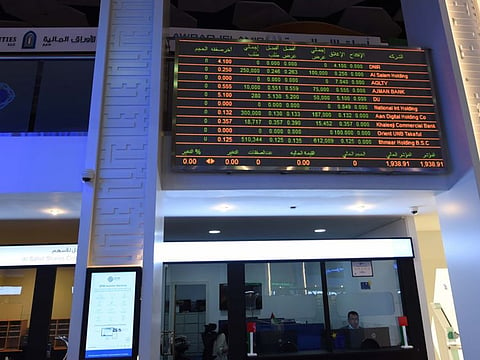UAE’s financial markets need more depth
Banks should not be sole option for businesses requiring ready access to funds

The lack of depth and coverage of regional debt and equity markets is well known and documented. We have puny equity capital markets ... and even those cater only to the larger companies. They are shallow and listless.
The debt capital market comprises almost just a single source — banks.
A sprinkling of a couple of debt funds and finance companies operate on the fringe.
Disintermediation of banks that should have happened by now, given the wealth of the UAE, has just not happened and has neither been encouraged or facilitated.
Given the catastrophic impact Covid-19 has had on businesses and banks (and the true fallout is yet to come), there is no better time than now for the government to take a very hard look at the implications of not moving fast enough on the development of the capital markets. Never before has the absence of disintermediation of banks come home to roost more emphatically than now.
The excessive dependence on banks for debt financing has been well and truly demonstrated, at some risk to the financial system. Given the fact that a few banks — perhaps six or seven and likely to shrink further — account for around 80 per cent of all loans and deposits in the UAE, this oligopoly needs to change for a host of reasons.
Many teething problems
Online lending platforms should have taken off, as the UAE’s debt market exploded between 2005 and 2015 — yet, this has not happened. This is because the ecosystem for both debt and equity capital markets simply does not exist.
The lack of a strong regulatory framework (company law) addressing corporate governance, absence of oversight and regulation (not licensing) of the auditor community, poor contract enforceability, inadequate culpability (dodgy CFOs are not liable in any way!), and the absence of a rating agency are among the main factors that make for an infertile ground for the growth of markets.
Chasing overseas prospects
The other aspect to be considered is the untapped capital pools that exist in the region — insurance companies, family offices, high net-worth individuals, financial institutions and so on, all chasing assets and yield and yet remitting capital abroad as they find few avenues in the country. Retaining and deploying capital locally will also have significant multiplier effects on the economy and employment as well.
Local capital will be more appropriate as investors on the ground understand local business practices and local knowledge will go a long way in making investment or lending decisions easier than will be the case for overseas capital providers.
Starved of funds
The economic effects of the pandemic will doubtless be catastrophic. The rebuilding and repositioning of the UAE economy has already been launched by the government. Addressing the issue of the financial market must take its place on top of the list.
Attracting new companies with good physical infrastructure and ease of doing business is fine, but access to finance, especially for SMEs, has always been a global problem and needs to be addressed in the UAE in a more comprehensive manner. I have seen, over the past 26 years in the UAE, hundreds of high quality SMEs stymied in their ambition and growth by a severe paucity of equity or even debt capital.
Avenues of exits for retiring owners or those wanting to cash out part of their stake in their businesses have been so limited, as to have resulted in sub-optimal outcomes for both owners and their companies.
The task of building a governance and regulatory infrastructure for a truly deep capital market is a daunting and time consuming one. The UAE and indeed all open economies will have to think hard to reinvent themselves, just as companies have to do, to survive.
The UAE positioning itself as a hospitable host to new-age businesses — AI, telecom, etc — is timely indeed, but urgent attention needs to be simultaneously focused on creating the environment that enables availability of appropriate capital at the right time to business. This should form an absolutely crucial part of a reinvention strategy.
— Vikram Venkataraman is managing director at Vianta.






